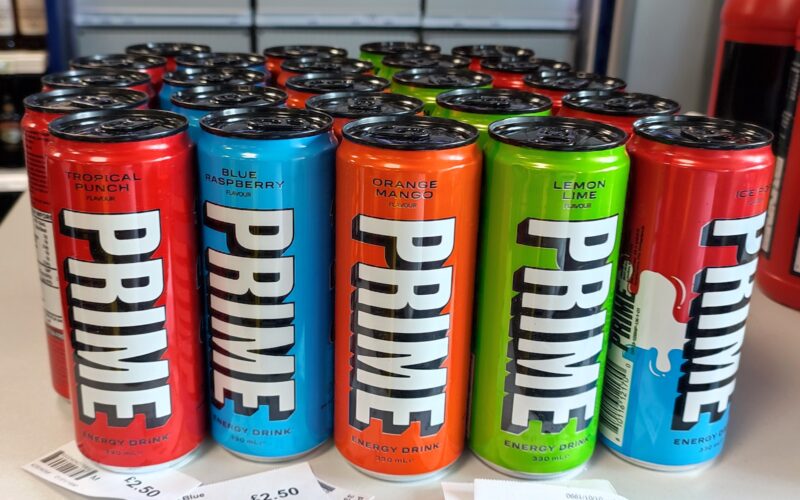In the dynamic and ever-evolving world of trendy beverages, Prime has successfully carved out a significant niche. It captivates a predominantly young audience with its eye-catching vibrant colors and alluring flavors. Launched amidst much fanfare and backed by clever marketing, this beverage has quickly become a social media sensation, gaining endorsements from celebrities and influencers alike.
However, despite its popularity and widespread appeal, there’s growing concern among health professionals about what lies beneath its flashy exterior. Behind the engaging advertisements and Instagram-worthy appearances, Prime’s composition includes ingredients that are drawing scrutiny from health experts. These ingredients are noted for their potentially harmful effects on consumers’ health, particularly among adolescents who are the primary consumers of such products. This concern is amplifying as more attention is paid to the long-term health implications of the ingredients used in these trendy drinks.
A Closer Look at Prime’s Ingredients
Dr. Helen Bond, a registered dietitian, voices significant concern regarding the complex, chemical-laden ingredients list featured in Prime. “Many consumers struggle to decipher the long, intricate ingredient lists on products like Prime,” she explains. “While ingredients such as artificial colorants and preservatives certainly enhance the visual appeal of a drink, they contribute no nutritional value and could pose health risks over time.” Her comments highlight a growing unease among health professionals about the potential long-term effects of these artificially enhanced beverages on consumer health.
Potential Health Effects
The health implications of Prime are particularly concerning given its widespread popularity among young consumers. “The high sugar content and artificial sweeteners in drinks like Prime can contribute to a range of serious health issues, including obesity, diabetes, and even heart disease over the long term,” Dr. Helen Bond explains. Such additives, commonly found in many modern beverages, are becoming a major health worry as their consumption increases among the youth.
Furthermore, the caffeine content in Prime should not be underestimated. Dr. Jacob Meyers, a cardiologist, highlights the potential dangers: “The levels of caffeine present in Prime are often much higher than those found in traditional sodas or even coffee. This can lead to an increased heart rate and elevated blood pressure, which is particularly concerning for young consumers.” These effects underscore the risks associated with the high caffeine levels that are marketed to and consumed by younger demographics, raising alarms about their safety and appropriateness.
Real Consumer Impact
Emily Thompson, a college student, has firsthand experience with the side effects of Prime, a testament to its growing influence and the emerging concerns associated with its use. “After drinking Prime regularly, I noticed more frequent headaches and difficulty sleeping,” she shared. It was only after consulting with a health professional that Emily realized the underlying cause: “The high caffeine content could be affecting me.” Stories like Emily’s are becoming increasingly common as the drink’s popularity continues to climb among young consumers, drawing attention to the potential adverse effects of its ingredients.
Gut Health Concerns
From a gastrointestinal perspective, the impact of consuming beverages like Prime can be quite detrimental. Dr. Laura Shields, a gastroenterologist, points out significant concerns related to the artificial sweeteners contained in these drinks. “Artificial sweeteners have been shown to disrupt the microbiome balance,” she explains, emphasizing the long-term consequences of such disruptions, which can include glucose intolerance and various digestive problems. Dr. Shields further elaborates on the broader implications of other ingredients, stating, “Additives and preservatives might not cause immediate symptoms, but their impact over time can lead to significant gut health issues, such as inflammation and a weakened gut barrier.” These comments underscore the potential hidden dangers of regularly consuming such beverages, which may appear harmless initially but pose serious health risks over time.
Broader Dietary Implications
The widespread consumption of Prime among youths highlights broader dietary concerns. According to Dr. Bond, “It’s crucial that we guide our younger populations towards healthier dietary choices. The appealing marketing of Prime overshadows significant health risks and contributes to unhealthy dietary patterns that can have long-lasting effects.”
In summary, while Prime may seem like just another fun and harmless beverage, its consumption raises substantial concerns among health professionals. The combination of high sugar and caffeine levels, along with a plethora of artificial ingredients, suggests that moderation is essential. As more consumers and guardians become aware of these risks, it might prompt a shift towards more natural and healthful beverage choices, fostering better long-term health outcomes for today’s youth.

